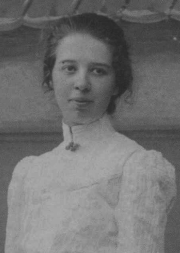Clara Wichmann
Clara Wichmann | |
|---|---|
 | |
| Born | Clara Gertrud Wichmann 17 August 1885 Hamburg, German Empire |
| Died | 15 February 1922 (aged 36) The Hague, Netherlands |
| Nationality | German–Dutch |
| Other names | Clara Meijer-Wichmann |
| Occupation(s) | Lawyer, writer |
| Movement | Feminism, Anarchism |
| Spouse |
Jonas Meijer (m. 1921–1922) |
| Children | Hetty Clara Passchier-Meijer (daughter) |
| Parents |
|
| Relatives | Erich Wichmann (brother) |
| Part of a series on |
| Anarcha-feminism |
|---|
 |
Clara Gertrud Wichmann (17 August 1885 – 15 February 1922) was a German–Dutch lawyer and anarchist feminist activist, who became a leading advocate of criminal justice reform and prison abolition in the Netherlands.
Biography
In 1885, Clara Wichmann was born in
She developed a theory of criminal law that advocated for the abolition of prisons and punitive justice,[3][4] which she elaborated in her thesis,[1][4] graduating as a Doctor of Law in 1912.[3][4] In 1914, she was employed by the Dutch Statistics Office as a lawyer, but was soon promoted to deputy director of the Social Welfare Institute. She collaborated with Jacques de Roos on compiling criminal statistics, and in 1919, she succeeded de Roos as head of the Judicial Statistics Department.[4]
During her studies, she had joined the
She became an activist in the prison abolition movement and campaigned against punitive justice, which she described as "a blot of backwardness, coarseness, shallowness and harshness."
In 1921, she married Jonas Meijer, a pacifist conscientious objector.[1][2][4] The couple were close to the Dutch anarchists Albert de Jong and Bart de Ligt.[1] Wichmann died in 1922, a few hours after giving birth to her daughter Hetty Clara Passchier-Meijer.[2]
Legacy
Jonas Meijer continued to publish Wichmann's work after her death. Though an
Selected works

- Wichmann, Clara; van den Bergh van Eysinga-Elias, Juliette (1913). De vrouw in Nederland voor honderd jaar en thans (in Dutch). OCLC 779058713.
- ————————; Werker-Beaujon, Cornelia M.; Werker, W.H.M., eds. (1914–1918). De vrouw, de vrouwenbeweging en het vrouwenvraagstuk: encyclopaedisch handboek (in Dutch). OCLC 781595790.
- ———————— (1917). Inleiding tot de philosophie der samenleving (in Dutch). OCLC 905784833.
- ———————— (1917). De vrouw en de vredesbeweging in verband met de ontwikkeling der wereldbeschouwing (in Dutch). OCLC 64895013.
- ———————— (1920). Het Russische huwelijks- en familierecht (in Dutch). OCLC 173230983.
- ———————— (1920). De theorie van het syndicalisme (in Dutch). OCLC 173230967.
- ———————— (1920). Misdaad, straf en maatschappij (in Dutch). OCLC 173230982.
- Posthumously published
- Wichmann, Clara (1922). Die Grausamkeit der herrschenden Auffassung über Verbrechen und Strafe (in German). OCLC 72259776.
- ———————— (1923). Mensch en Maatschappij (in Dutch). OCLC 81797642.
- ———————— (1924). Bevrijding (in Dutch). OCLC 81280389.
- ———————— (1930). Misdaad, straf en maatschappij (in Dutch). OCLC 37885483.
- ———————— (1936). Vrouw en Maatschappij (in Dutch). OCLC 781595791.
References
- ^ ISBN 90-5260-173-9.
- ^ a b c d e f g h i j "Kurzbiographie über Clara Wichmann". Marxists Internet Archive (in Dutch). 10 June 2007. Retrieved 14 June 2023.
- ^ a b c Lenoir, Hugues (March 2015). "L'anarchisme au pays des provos". Le Monde libertaire (in French). Retrieved 14 June 2023.
- ^ a b c d e f g h i j k l m n o p van der Bie, Ronald (11 August 2022). "Clara Wichmann en haar baanbrekende werk voor het strafrecht". Centraal Bureau voor de Statistiek (in Dutch). Retrieved 14 June 2023.
- ^ "Wat wij doen". Clara Wichmann Institute (in Dutch). Retrieved 14 June 2023.
- ISSN 1574-0196.
Further reading
- Kloek, Els (1 September 2017). "Wichmann, Clara Gertrud (1885-1922)". Online Dictionary of Dutch Women (in Dutch). Huygens Institute for the History of the Netherlands. Retrieved 14 June 2023.
- Rimmelzwaan, Mieke (1987). "WICHMANN, Clara Gertrud". BWSA (in Dutch). Vol. 2. International Institute of Social History. pp. 179–183. Retrieved 14 June 2023.
